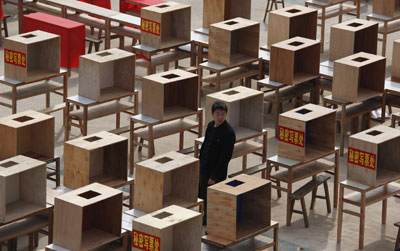Village elections taking place this weekend in southern Guangdong province’s Wukan illustrate the strengths and weaknesses of China’s media control. Censorship measures have not prevented strong domestic and international coverage of the democratic process. But has official tolerance of dissenting views increased since leaders cracked down on the attempted Jasmine revolution last year? Or is Wukan not a real challenge to one-party rule, and therefore OK to write about?
First, the restrictions: When land grabs sparked protests in the village in late 2011, locals fought Internet blocks and a police presence to publicize their activity online. After the authorities agreed to allow the elections to defuse the unrest, Chinese journalists trying to cover the campaign were turned away. Plainclothes police attacked foreign journalists reporting on a parallel case of land-related demonstrations in eastern Zhejiang province in February. And censors were still deleting probing online commentaries on Wukan in 2012, according to the Hong Kong University-based China Media Project.
Then the coverage: The international media have been steadily reporting the vote as an advance in Chinese democracy — although village elections are common in China, and locals tell reporters that the district branch of the Communist Party retains the real power. Yet state media have also been on the scene (see this Tweet from December 2011). On February 3, official news agency Xinhua broadcast an interview with a cheerful voter under the headline, “One person, one vote:” “It’s the first time I’ve voted…It feels good.”
Finally the spin, courtesy of state newspapers like the Global Times. Both Chinese and English-language editions carried this critique of foreign press coverage last month:
Western journalists in China know little about the reality of China’s rural areas. A journalist with The Wall Street Journal wrote that elections in other villages were strictly controlled by the Communist Party. He has probably never seen for himself what China’s village-level elections look like.
Internet reporting and international media attention combined to present the Wukan elections as a grassroots challenge to Communist rule. Journalists writing for the state are tasked with implying instead that the events have been thanks to — not in opposition to — the central authorities. “Wukan’s successful election this time was supervised by external forces, including those of the government, to ensure fairness,” the Global Times explained.
Managed coverage of political developments is better than none at all, but it does not equal openness. This time last year, pro-democracy Jasmine protests were crushed before they ever got going. Foreign journalists were manhandled, while local writers were arrested; at least one, Chen Wei, was sentenced to nine years in prison for inciting subversion against state power in December 2011. Four days later, activist Chen Xi was sentenced to 10 years on the same charge. His online articles were produced against him in court but his arrest was for an unrelated crime: Campaigning for independent candidates to his local People’s Congress, according to CPJ research. And writers who cover anti-government unrest in Tibet are already facing heavy penalties in 2012.
Are actors in Wukan safe from similar reprisals from the government? Will the elections ensure that the local community’s demands are met — or are they conciliatory theater? If political reform is really underway, why are pro-democracy advocates like Liu Xiaobo behind bars? When the weekend’s results are in, these are the questions the international media should insist on asking. Despite signs of progress, Chinese journalists still can’t.
